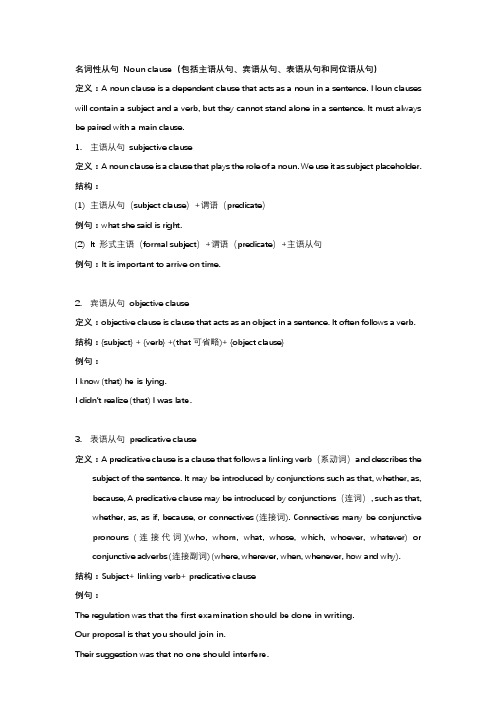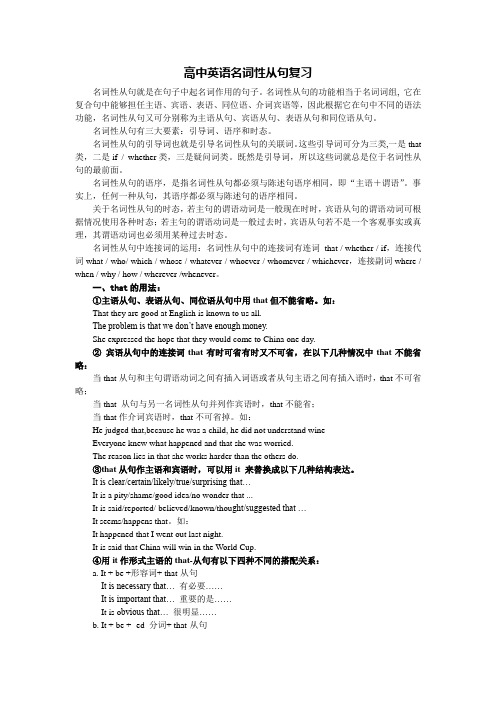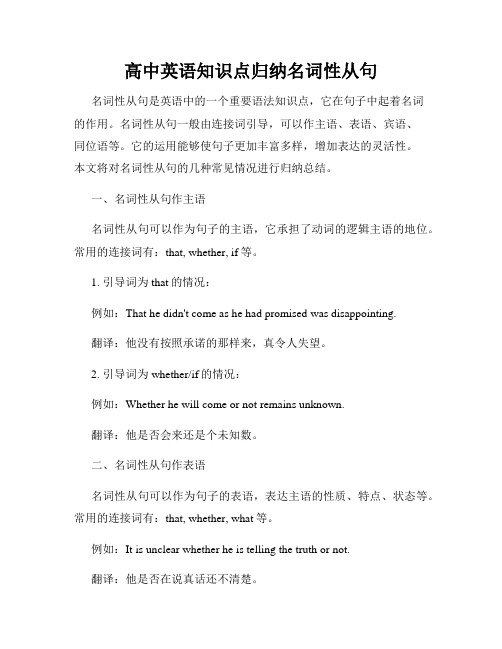高中英语语法复习3 名词性从句
高中英语教资语法点-从句

名词性从句 Noun clause(包括主语从句、宾语从句、表语从句和同位语从句)定义:A noun clause is a dependent clause that acts as a noun in a sentence. Noun clauses will contain a subject and a verb, but they cannot stand alone in a sentence. It must always be paired with a main clause.1.主语从句 subjective clause定义:A noun clause is a clause that plays the role of a noun. We use it as subject placeholder.结构:(1)主语从句(subject clause)+谓语(predicate)例句:what she said is right.(2)It 形式主语(formal subject)+谓语(predicate)+主语从句例句:It is important to arrive on time.2.宾语从句 objective clause定义:objective clause is clause that acts as an object in a sentence. It often follows a verb. 结构:{subject} + {verb} +(that可省略)+ {object clause}例句:I know (that) he is lying.I didn’t realize (that) I was late.3.表语从句 predicative clause定义:A predicative clause is a clause that follows a linking verb(系动词)and describes the subject of the sentence. It may be introduced by conjunctions such as that, whether, as, because, A predicative clause may be introduced by conjunctions(连词), such as that, whether, as, as if, because, or connectives (连接词). Connectives many be conjunctive pronouns (连接代词)(who, whom, what, whose, which, whoever, whatever) or conjunctive adverbs (连接副词) (where, wherever, when, whenever, how and why).结构:Subject+ linking verb+ predicative clause例句:The regulation was that the first examination should be done in writing.Our proposal is that you should join in.Their suggestion was that no one should interfere.注:if不能引导表语从句。
高中英语语法:名词性从句知识汇总

高中英语语法:名词性从句知识汇总在复合句中具有名词的性质的作主语、表语、同位语、宾语的从句叫名词性从句。
因此,我们把主语从句、表语从句、同位语从句和宾语从句这四种从句统称为名词性从句。
当名词性从句要采用陈述句语序。
由一个含疑问意义的连词引起时,必须将该连词放在名词性从句的开头,且该从句语序不能倒装。
一、引导名词性从句的关联词引导名词性从句的关联词大致相同,它们分别是:连词:that, whether, if;关系代词:who, what, which , whom, whose, whatever, whoever, whomever, whichever;关系副词:when, where, how, why, however, whenever, wherever。
引导从句时一般不用逗号和主句分开。
连词that在从句中不作成分,不含疑问意义;而wh-连词在从句中作成分,且含有疑问意义;或what/where从句相当于一个名词后加一个定语从句。
It worried her a bit that her hair was turning grey.她的头发在变白令她有点担忧。
(that在从句中只起引导词作用,不作成分)What caused the accident is still a complete mystery.事故发生的原因仍然是个不解之谜。
(What在从句中作主语)2、that与whether引导名词性从句的区别。
(1)动词doubt表示“怀疑、不知道”解时,肯定句接whether引导的宾语从句;否定句don’t doubt和疑问句Do you doubt要接that引导的从句。
I don’t doubt that he will come soon.我不怀疑他不久会来。
(此处不用whether)Can you doubt that he will win?你怀疑他会赢吗?(此处不用whether)比较:doubt表示“不信”解时,表示强烈的不相信时,在陈述句中可接that从句。
名词性从句讲解-思维导图-附练习题-高中英语语法-三大从句-语法讲解与练习

名词性从句讲解思维导图(附练习题)catch a cold。
Ⅲwhichever ‘无论哪个;无论哪些’,既指人,又指物. 可修饰名词与of连用Whichever book you borrow doesn’t matter to us。
Whichever of us fulfills his task will lend a hand to others。
定义:在复合句中充当宾语功能的句子叫宾语从句We can learn what we didn't know。
We find it necessary that we (should)practice English every day.★某些作表语的形容词,如sure,happy, glad,certain等之后可带宾语从句I am glad that you can come and help me.:①wish/would rather后的宾语从句中要用虚拟语气。
I wish I had finished my homework yesterday。
I’d rather you had been there yesterday②在表示建议,命令, 请求的词后面的宾语从句当中用should + V,可以省略His pale face suggested that he was ill so I suggested that he should goto see the doctor.He insisted that he was innocent and insisted that he should be set free.③注意it作形式宾语的结构We all thought it a pity that we had missed the lesson。
I took it for granted that they were not coming.④ that一般不接介词宾语,偶尔可作except, in的宾语;其它介词后面需用it作形式宾语He differs from his roommates in that he devoted his spare time toreading.He knows nothing about Jim except that he is from London。
高中英语2025届高考语法复习名词性从句知识讲解练习

高考英语语法复习名词性从句讲解练习名词性从句是指在复合句中起名词作用的句子,功能相当于名词词组。
名词性从句在复合句中能作主语、宾语、表语、同位语等,根据在句中的语法功能可分为主语从句、宾语从句、表语从句和同位语从句。
一、主语从句【定义】在复合句中,作主语的句子称为主语从句。
【常见的连接词】(连接词在句中不能省略)that, whether, who, what, whatever, whoever, where, when, why, how等。
【用法】连接词 that 引导That we should learn English well is very important.主语从句中 we should learn English well句子完整,不缺成分,用that引导,that 不能省连接词whether,if 引导whether 引导的主语从句可放句首,也可放句中,表“是否”if 引导的主语从句只能引导动词后的宾语Whether I will go or not depend on the weather.It remains to be seen whether / if they can finish the task in time.2.连接代词what, who, which, whose, whatever, whichever,whoever等引导What matters most is your attitude.3.连接副词when,where,why,how等引导How he made it is still unknown.4.it作形式主语为了避免句子头重脚轻,通常把形式主语it放在句首,真正的主语放在句子后面。
常见句型:(1) It is + n.+ that + 句子It is +(a pity / a shame / a fact …)+ that ...(2) It is + adj.+ that + 句子It is +(true / clear / important …)+ that ...(3) It is + 过去分词 + that + 句子It is+ said / announced / expected / believed / hoped… + that ...(4) It seems /appears / happens / turned out that + 句子(5) It hit sb./occurred to sb.that + 句子二、宾语从句【定义】在复合句中,作宾语的句子称为宾语从句。
高中英语名词性从句复习

高中英语名词性从句复习名词性从句就是在句子中起名词作用的句子。
名词性从句的功能相当于名词词组, 它在复合句中能够担任主语、宾语、表语、同位语、介词宾语等,因此根据它在句中不同的语法功能,名词性从句又可分别称为主语从句、宾语从句、表语从句和同位语从句。
名词性从句有三大要素:引导词、语序和时态。
名词性从句的引导词也就是引导名词性从句的关联词。
这些引导词可分为三类,一是that 类,二是if / whether类,三是疑问词类。
既然是引导词,所以这些词就总是位于名词性从句的最前面。
名词性从句的语序,是指名词性从句都必须与陈述句语序相同,即“主语+谓语”。
事实上,任何一种从句,其语序都必须与陈述句的语序相同。
关于名词性从句的时态,若主句的谓语动词是一般现在时时,宾语从句的谓语动词可根据情况使用各种时态;若主句的谓语动词是一般过去时,宾语从句若不是一个客观事实或真理,其谓语动词也必须用某种过去时态。
名词性从句中连接词的运用:名词性从句中的连接词有连词that / whether / if,连接代词what / who/ which / whose / whatever / whoever / whomever / whichever,连接副词where / when / why / how / wherever /whenever。
一、that的用法:①主语从句、表语从句、同位语从句中用that但不能省略。
如:That they are good at English is known to us all.The problem is that we don’t have enough money.She expressed the hope that they would come to China one day.②宾语从句中的连接词that有时可省有时又不可省,在以下几种情况中that不能省略:当that从句和主句谓语动词之间有插入词语或者从句主语之间有插入语时,that不可省略;当that 从句与另一名词性从句并列作宾语时,that不能省;当that作介词宾语时,that不可省掉。
2023年高中英语语法:名词性从句用法详解及强化练习分析

2023年高中英语语法:名词性从句用法详解及强化练习分析名词性从句分类简述名词性从句,就是指其作用相当于名词的从句,它包括主语从句、表语从句、宾语从句和同位语从句。
一、主语从句1. 引导词:主语从句就是在复合句中用作主语的从句,引导主语从句的引导词主要有三类:一是that;二是whether;三是那些可以用作疑问词的词语,如what, who, which, when, where, how, why 等。
如:That we shall be late is certain. 我们要晚了,这是确定无疑的。
What he says is not important. 他说的话并不重要。
Whether it will do us harm remains to be seen. 是否对我们有害还要看一看。
2. 形式主语:有时为了避免句子显得“头重脚轻”,可用it作形式主语放在句首,而把真正的主语放在句末。
如:It’s a pity that he didn’t come. 很遗憾他没来。
It was uncertain whether he could come or not. 他是否会来还不肯定。
这三句句首的it均为形式主语,相应的真主语分别是that he didn’t come / what she did / whether he could come or not。
二、表语从句表语从句就是在复合句中用作表语的从句。
一般说来,可用于引导主语从句的引导词也可用于引导表语从句,如that, what, who, which, when, where, how, why, whether等。
如:My idea is that we should do it right away. 我的意见是马上就干。
That is what he meant. 这就是他的意思。
The problem is how we can find him. 问题是我们如何找到他。
高中英语知识点归纳名词性从句

高中英语知识点归纳名词性从句名词性从句是英语中的一个重要语法知识点,它在句子中起着名词的作用。
名词性从句一般由连接词引导,可以作主语、表语、宾语、同位语等。
它的运用能够使句子更加丰富多样,增加表达的灵活性。
本文将对名词性从句的几种常见情况进行归纳总结。
一、名词性从句作主语名词性从句可以作为句子的主语,它承担了动词的逻辑主语的地位。
常用的连接词有:that, whether, if等。
1. 引导词为that的情况:例如:That he didn't come as he had promised was disappointing.翻译:他没有按照承诺的那样来,真令人失望。
2. 引导词为whether/if的情况:例如:Whether he will come or not remains unknown.翻译:他是否会来还是个未知数。
二、名词性从句作表语名词性从句可以作为句子的表语,表达主语的性质、特点、状态等。
常用的连接词有:that, whether, what等。
例如:It is unclear whether he is telling the truth or not.翻译:他是否在说真话还不清楚。
三、名词性从句作宾语名词性从句可以作为句子的宾语,接在及物动词、介词后面。
常用的连接词有:that, whether, if, what, who, whom, which, whose等。
1. 当宾语从句是及物动词的宾语时,常用连接词是that。
例如:He said that he would come tomorrow.翻译:他说他明天会来。
2. 当宾语从句是介词的宾语时,常用连接词是whether/if, 当介词为介词to时,连接词也可以用为不定式to。
例如:She is not sure about whether/if he will join us.翻译:她不确定他是否会加入我们。
高中英语名词性从句语法讲解

This is how they overcome the difficulties.
My strongest memory is when I attended an
American wedding.
5. 其他连词as if, because, as, as though 引导的表语从句
C.表示某种状态的:remain, keep, prove, continue, stay等.
1. that 引导的表语从句 that 仅起连接作用,无意义,在句中不作任何成分, 通常不可省略。这种从句往往是对主句主语的内容起 进一步解释的作用。
e.g. The chance is that one smoker in four will die from
think等变为否定形式;
e.g. I don’t think you are right.
(5) 在think,believe,imagine,suppose,guess,hope
等动词以及 I’m afraid 等后,可用so代替一个一定的
宾语从句,还可用not代替一个否定的宾语从句:
e.g. 一Do you believe it will clear up你认为天气会转晴吗
连接副词:when, where, how, why 连接代词和连接副词一般做句子的某一成份
The Subject Clause
用作主语的从句叫主语从句。引导主语从句的 连接词有:
连词that, whether;
连接代词what, whatever, who, whoever, whom, whomever, whose, which,
- 1、下载文档前请自行甄别文档内容的完整性,平台不提供额外的编辑、内容补充、找答案等附加服务。
- 2、"仅部分预览"的文档,不可在线预览部分如存在完整性等问题,可反馈申请退款(可完整预览的文档不适用该条件!)。
- 3、如文档侵犯您的权益,请联系客服反馈,我们会尽快为您处理(人工客服工作时间:9:00-18:30)。
语法复习三:名词性从句名词性从句相当于名词,可分别作主句的主语、表语、宾语和同位语。
因此,名词性从句厅分为主语从句、表语从句、宾语从句和同位从句。
(一)引导名词性从句的连接词1、连接代词:who, whose, whom, what, which。
有词义,在从句中担任成分,如主语、表语、宾语、或定语等。
2、连接副词:when, where, why, how。
有词义,在从句中担任成分,作状语。
3、连接词:that, whether, if, as if。
that 无词义,在从句中不担任成分,有时可省略;if (whether), as if虽有词义,但在从句中不担任成分。
注意:连接代词与连接副词在句中不再是疑问句,因而从句中谓语不用疑问式。
连接代词与连接副词在从句充当句子成分,连接词whether 和if(是否),as if(好象)在从句中不充当句子成分,只起连接作用。
根据句义,如果连接代词与连接副词,whether、if 和as if都用不上时,才用that作连接词(that本身无任何含义)。
(二)主语从句1、主语从句在复合句作主语。
e.g. Who will go is not important.2、用it作形式主语,主语从句放在句末。
e.g. It doesn’t matter so much whether you will come or not.3、that引导主语从句时,不能省略。
e.g. That he suddenly fell ill last week made us surprised.(三)表语从句1、表语从句在复合句中作表语,位于系动词之后。
e.g. The question was who could go there.2、引导表语从句的连接词that有时可省去。
e.g. My idea is (that) we can get more comrades to help in the work.(四)宾语从句1、宾语从句在复合句中作宾语。
引导宾语从句的连词that一般可省略。
e.g. I hope (that) everything is all right.2、介词之后的宾语从句,不可用which或if连接,要分别用what或 whether。
e.g. I’m interested in whether you’ve finishe d the work..I’m interested in what you’ve said.3、whether与if都可以引导宾语从句,常可互换。
但下面情况不能互换。
①宾语从句是否定句时,只用if,不用whether。
e.g. I wonder if it doesn’t rain.②用if 会引起误解,就要用whether。
e.g. Please let me know whether you want to go.(此句如果把whether改成if,容易当成条件句理解)③宾语从句中的whether 与or not直接连用,就不能换成if;不直接连用,可换。
e.g. I don’t know whether or not the report is true.I don’t know whether/ if the report is true or not.④介词后的宾语从句要用whether引导。
whether 可与不定式连用。
whether 也可引导主语从句、表语从句、同位语从句,还可引导让步状语从句,以上均不能换成if。
但引导条件从句时,只能用if,而不能用whether。
e.g. It depends on whether we have enough time.They don’t know whether to go there.Please come to see me if you have time.(五)同位语从句同位语从句在句中作某一名词的同位语,一般位于该名词(如:news, fact, idea, suggestion, promise等)之后,说明该名词的具体内容。
e.g. I have no idea when he will be back.The fact that he had not said anything surprised everybody.练习:名词性从句一、判断下列各句哪句含有名词性从句,并指出是什么从句:1. China is no longer what it used to be.2. The truth that the earth turn around the sun is known to all.3. It was snowing when he arrived at the station.4. How he persuaded the manager to change the plan is interesting to us all.5. The news that they had won the game soon spread over the whole school.6. The news that you told me yesterday was really disappointing.7. That is where Lu Xun used to live.8. He spoke as if he understood what he was talking about.9. Do you remember the teacher who taught us English at middle school?10. I wonder why she refused my invitation.二、用适当的连词填空:1. I can’t decide ____________ dictionary I should buy.2. That’s ____________ he refused my invitation.3. I am very interested in ____________ he has improved his pronunciation in such a short time.4. ____________ we need is more time.5. The fact ____________ she had not said anything at the meeting surprised everybody.6. ____________ and ____________ they will meet has not been decided yet.7. Please tell me ____________ you are waiting for.8. Is that ____________ you are looking for?9. Would you please tell me ____________ the nearest post office is?10. I don’t know ____________ he will agree to the plan or not.三、选择填空:1. Do you see _____ I mean?A. thatB./C. howD. what2. Tell me_____ is on your mind.A. thatB. whatC. whichD. why3. We must stick to _____ we have agreed on.A. whatB. thatC. /D. how4. Let me see _____.A. that can I repair the radioB. whether -I can repair the radioC. I can repair the radioD. whether can I repair the radio5. Keep in mind _____.A. that the teacher saidB. what did the teacher sayC. that did the teacher sayD. what the teacher said6. Could you advise me _____?A. which book should I read firstB. what book should I readfirstC. that book 1 should read firstD. which book I should readfirst7. He was criticized for _____.A. he had done itB. what he had doneC. what had he doneD. that he had done it8. Would you kindly tell me _____?A. how can I get to the Beijing Railway StationB. how I can get to the Beijing Railway StationC. where can I get to the Beijing Railway StationD. whether can I get to the Beijing Railway Station9. Mrs. Smith was very much impressed by _____.A. what had she seen in ChinaB. that she had seen in ChinaC. what she had seen in ChinaD. which had she seen in China10. We took it for granted ___A. that they were not comingB. that were they not comingC. they were coming notD. were they not coining11. I really don't know _____A. I should do nextB. what should I do nextC. what I should do nextD. how I should do next12. I'm afraid _____.A. the little girl will have to be operated onB. that will the little girl have to operate onC. the little girl will have to operate onD. that will the little girl have to be operated on13. She walked up to _____ .A. where did I standB. where I stoodC. I stood thereD. where I stood there14. Can you tell me _____?A. who is that gentlemanB. that gentleman is whoC. who that gentleman isD. whom .is that gentleman15. We'll give you _____.A. that do you needB. what do you needC. whatever you needD. whether do you need16. They want us to know _____ to help us.A. what can theyB. what they canC. how they canD. how can they17. We must put _____ into practice.A. what we have learnedB. that we have learnedC. that have we learnedD. what have we learned18. Did she say anything about _____?A. that the work was to be doneB. how was the work to be doneC. that was the work to be doneD. how the work was to be done19. He was never satisfied with _____.A. what she had achievedB. had what she achievedC. she had achievedD. that she achieved20. These photographs will show you _____.A. what does our village look likeB. what our village looks likeC. how does our village look likeD. how our village looks like21. Peter insisted _____ he pay the bill.A. on thatB. whatC. thatD. on which22. They urged _____ the library open during the vacation.A. whenB. whereC. whyD. that23. We wish we could have learned _____ when we were at high school.A. what you didB. that you had doneC. that what you didD. what did you do24.1 will describe to you _____ I saw when there.A. whatB. thatC. whichD./25. From _____ I should say he is a good worker.A. what 1 know of himB. that I do know of himC. what do I know of himD. that do I know of him26. I will give this dictionary to __ wants to have it.A. whomeverB. anyoneC. whoeverD. someone27._____ they will come here hasn' t been decided yet.A. WhatB. ThatC. WhenD. Where28. _____ was said here must be kept secret.A. WhoB. The thingC. WhateverD. Where29. It is still a question _____ we shall have our sports meet.A. ifB. thatC. whatD. when30. I'm going anyway. _____ she will go is up to her to decide.A. If or notB. Whether or notC. IfD. That31. It is strange _____ she have left without saying a word.A. thatB. whatC. whyD. how32. It is very clear _____ our policy is a correct one.A. whatB. thatC. whyD. where33. _____ Mr Zhang said is quite right.A. ThatB. WhenC. WhatD. Whether34. It has been decided _____ he will be sent there.A. ifB. whetherC. whyD. that35. It doesn' t matter _____he' s come back or not.A. ifB. whetherC. thatD. when36. It's a great pity _____ we won’t be able to finish the task on time.A. whenB. thatC. whyD. where37. It happened _____ I wasn't there that day.A. whenB. whyC. whereD. that38._____ you have done might do harm to other people.A. WhatB. ThatC. WhichD. The things39. _____ leaves the room last ought to turn oft the lights.A. AnyoneB. The personC. WhoeverD.Who40._____ the 2000 Olympic Games won't be held in Beijing is known to all.A. WhetherB. IfC. WheneverD. That41. _____ fails to see this will make a big mistake.A. ThatB. WhoeverC. WhetherD. Whether or not42. __ we need more equipment is quite obvious.A. WhatB. WhetherC. ThatD. Whatever43. Has it been announced _____?A. when are the planes to take offB. that are the planes to takeoffC. where are the planes to take offD. when the planes are to takeoff44. That is _____ we all support his idea.A. whatB. whyC. whereD. when45. That’s _____ we should do.A. thatB. whatC. howD. why46. _____ is troubling me is _____ I don’t understand _____ he saidA. What; that; whatB. What; what; whatC. That; that; whatD. Why; that; which47. Things were not _____ they seemed to be.A. whenB. whyC. thatD. what48. That’s _____ I want to say.A. all whatB. whatC. all whichD. what that49. That’s _____ .A. where our differences lieB. our differences lie thereC. where do our differences lieD. that where our differences lie50. That is _____ .A. where lived he thereB. where did he liveC. where he livedD. that where he lived51. The questions is _____.A. whether is it worth doingB. that if it is worth doingC. whether it is worth doingD. if it is worth doing52. Water will continue to be _____ it is today next in importance to oxygen.A. howB. whichC. whatD. as53. That's_____.A. how did I become a teacherB. how I became a teacherC. how a teacher I becameD. that I became a teacher54. They are just _____.A. that what shall I haveB. what shall I haveC. that I shall have whatD. what I shall have55. It looked ____.A. as if it was going to rainB. that as if it was goingto rainC. as if was it going to rainD. as if that it was goingto rain56. That's_____.A. how she did itB. that how did she do it.C. how did she do itD. what she did it57. That is _____ we decided to put the discussion off.A. whereB. whichC. thatD. why58. That’s _____ I lived when I was ten years old.A. whereB. at whichC. there whereD. when59. My suggestion is _____ we should send a few comrades to help them.A. ifB. thatC. when thatD. that where60. The idea _____ all people are selfish is wrong.A. whatB. thatC. whyD. if61. We heard the news _____ our team had won.A. thatB. whatC. whetherD. why62. The fact _____ he hadn’t said anything surprised us all.A. whyB. ifC. thatD. whether63.I have no idea _____ she will be back.A. thatB. whereC. that whenD. when64. We must keep in mind the fact _____ China is still a developing country.A. whetherB. thatC. whyD. when65. They have no idea at all _____.A. where he has goneB. where did he goC. where has he goneD. which place he has gone。
